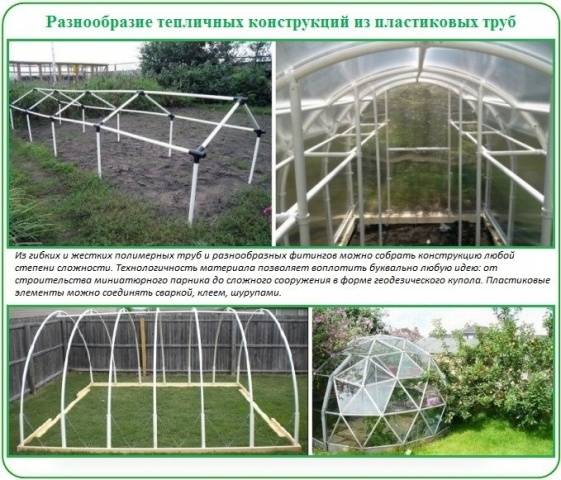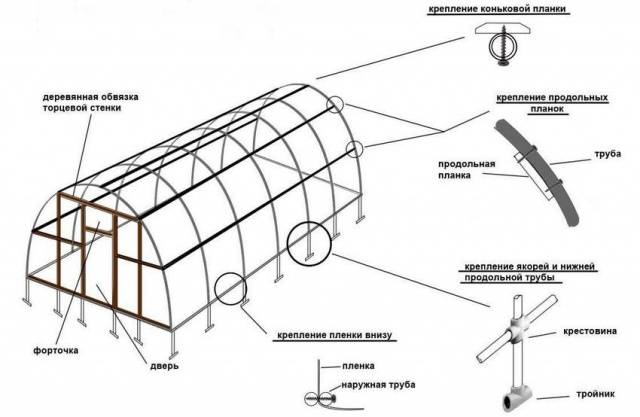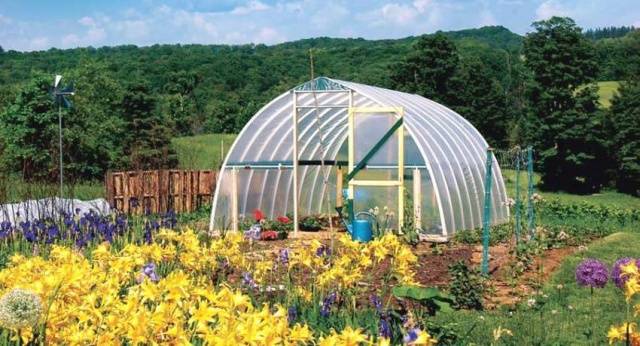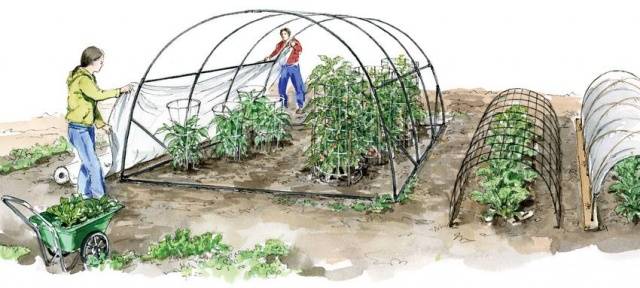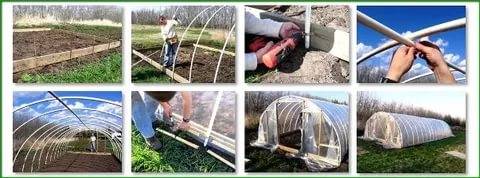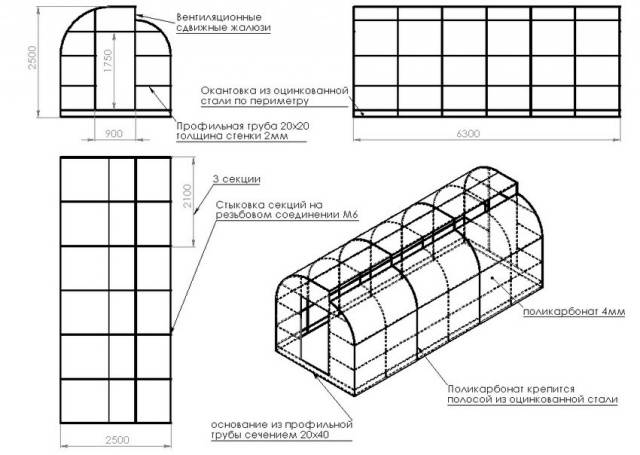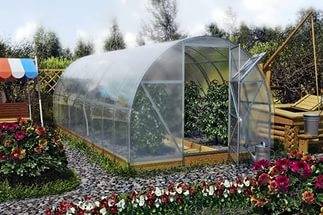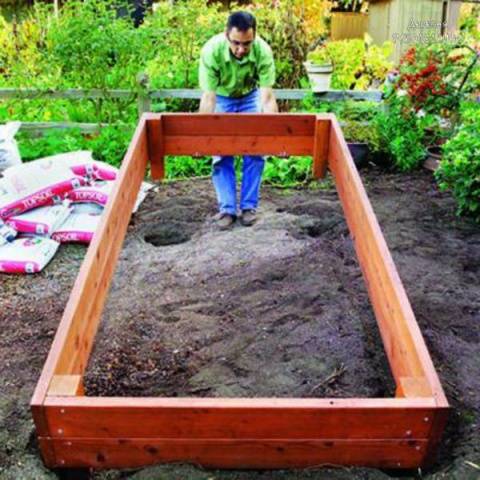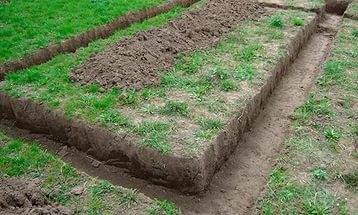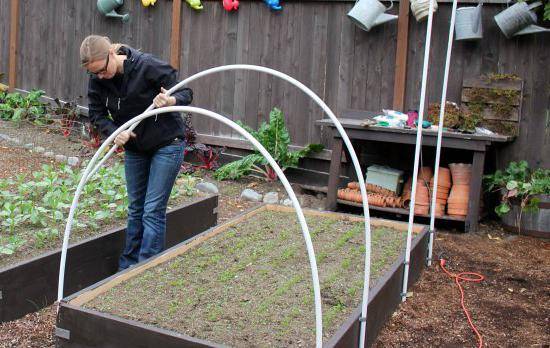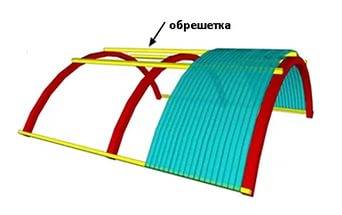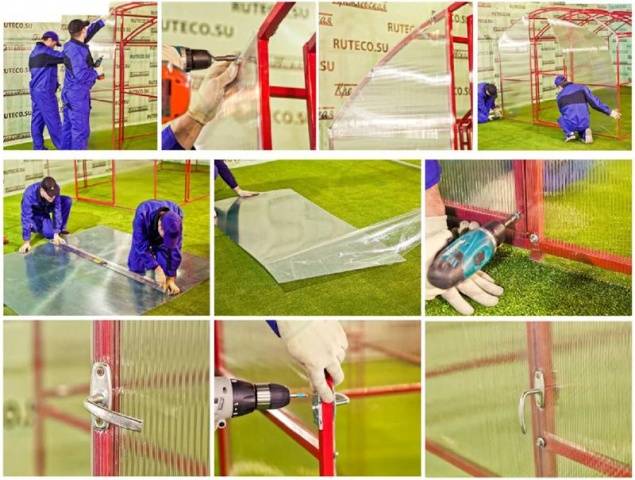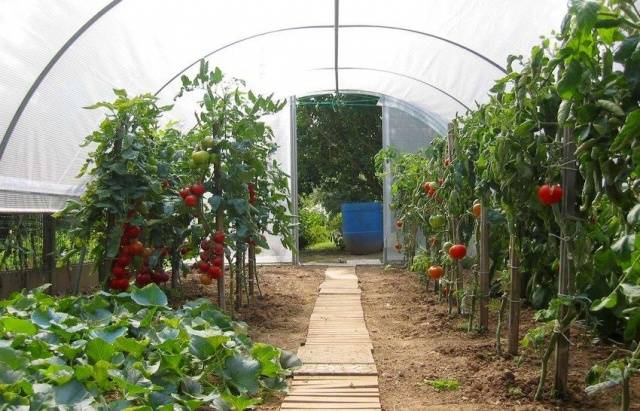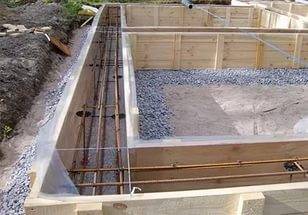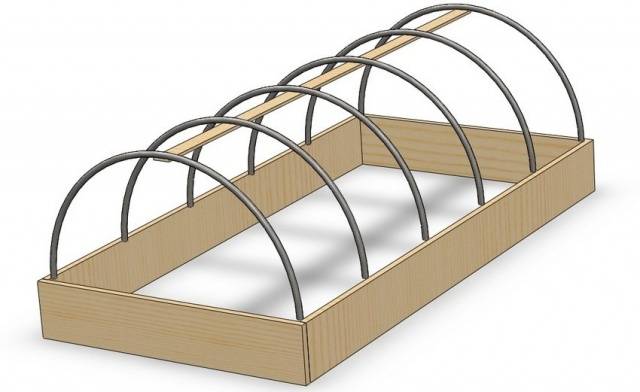Content
The greenhouse is based on a frame. It is made from wooden slats, metal pipes, profiles, corners. But today we will look at the construction of a frame from a plastic pipe. In the photo, a drawing will be provided for each model for a better understanding of the constituent parts of the structure. So let's find out how a greenhouse is made do it yourself from plastic pipes, and what shape the buildings are.
Existing varieties of plastic pipe greenhouses
The design of each greenhouse consists of almost the same components. Only the size of the structure and the roof scheme differ, which can be arched, shed or gable. The photo shows different options for frame structures made of plastic pipes. Using them, you can create a drawing of your future greenhouse.
For greenhouses with arched roofs, the lower base - the box is assembled from wood. Usually the entrance is boards or timber. The pipes are fixed to metal pins fixed in the ground. Sometimes the rods are replaced with wooden stakes, but this design will turn out to be short-lived. The pin protrudes from the ground approximately 400 mm in height. Its thickness should correspond to the inner diameter of the tubes. If the frame made will be covered with PET film, the ends of the structure should be optimally made of plywood or other similar material. A door and vents are cut through them. In the event that a polycarbonate greenhouse will decorate its yard, the ends are sewn up with the same material.
Frame structures with a gable and a pitched roof are sheathed polycarbonate and polyethylene. Glass used to be used, but the high cost and fragility of the material made it less popular. Gable and shed frames are fixed to a rigid base for better rigidity.
Construction of an arched greenhouse made of polypropylene pipes
The easiest way is to build a greenhouse from purchased blanks. Polypropylene pipes come in a set cut to a certain size with fasteners and fittings. Below in the photo you can see a drawing of one of these greenhouses. The frame is assembled as a constructor. A foundation is not required for it, it is enough just to level the site. If a greenhouse is made from plastic pipes with your own hands, here you have the opportunity to choose an individual size.
Choosing the right location for the greenhouse greenhouse
A greenhouse or a greenhouse of an arched structure made of polypropylene pipes must be correctly positioned on its site:
- it is optimal for the structure to choose a sunny place, not shaded by tall trees and buildings;
- it is necessary to provide for a convenient approach to the greenhouse;
- it is advisable to install a greenhouse in a less wind-blown area.
A gardener who has built a greenhouse in compliance with these nuances will receive a structure with minimal heat loss.
Step-by-step instructions for building a greenhouse made of polypropylene pipes
Even before construction begins, it is necessary to level the area for the greenhouse. It is advisable to loosen or compact the soil as little as possible so as not to disturb its structure. According to the finished drawing, they buy the required amount of material. Polypropylene pipes are suitable with a diameter of at least 20 mm. For the end strapping, you will need a wooden beam, plywood or any other sheet material.
So, having at hand all the materials and a drawing, they begin to build a greenhouse:
- A simple option for attaching an arched frame, especially for a small greenhouse, is the pin method. The prepared area is marked out, transferring the dimensions of the future frame. Metal rods are driven into the ground along the marking lines of the long side walls of the greenhouse. The strength of the frame depends on the distance between the rods. The less often the step, the more stable the greenhouse will turn out. A box is knocked down from a board or wooden beam along the perimeter of the frame. Polypropylene pipes are bent with an arc and pushed onto the pins of opposite walls. In the final, a skeleton should be made of arcs fixed to a wooden frame.Advice! The distance between the arches for polycarbonate can be made larger. The weight and strength of the material will make the greenhouse heavy, stable, strong. A small step of arcs under the film will not only strengthen the structure, but also reduce the sagging of the film.
For fastening the end walls, a frame is assembled from a bar with a section of 50x50 mm. The frame of the front wall is made taking into account the door and the window. On the back wall, only a window is usually provided, but you can install another door to make the greenhouse a walk-through. Wooden end frames are fixed to a common skeleton of arcs. Additional stiffeners are installed from the timber. At the highest point of the arcs along the frame, the upper screed element of the entire structure is fixed with clamps.
- When the greenhouse frame is completely ready, a PET film is pulled over it. At the bottom it is nailed with nails and wooden planks. On the body, fixation begins from the middle, gradually moving towards the corners. At the ends of the greenhouse, the edges of the film are collected with an accordion and also nailed to a wooden frame.Advice! To make a greenhouse made of plastic pipes less likely to overlap, it is better to use multilayer or reinforced polyethylene.
- The end side can be sewn up with any sheet material, but it is better to make the walls transparent too, so that more light gets into the greenhouse. For the manufacture of film ends from polyethylene, fragments of the covering of doors and vents are cut out. They are attached to a wooden frame with planks or staples of a construction stapler.
On this, the greenhouse made of plastic pipes is ready, you can proceed to its internal arrangement.
The video shows the process of assembling a greenhouse from plastic pipes:
Arched greenhouse made of plastic pipes and polycarbonate
A big plus of plastic pipes is their long service life. This means that the greenhouse cover must also meet the same standards. Any film through the season or even every year will have to be changed. Polycarbonate is an ideal greenhouse sheathing material. The structure will turn out to be durable, warm and will last for many years. The photo below shows a drawing of a typical arched greenhouse covered with polycarbonate.
Choosing a place on the site, the type and size of the greenhouse
If a film greenhouse can be called a temporary structure, then a polycarbonate structure is more difficult to disassemble in order to move to another place. Here you immediately need to think over its permanent location. The selection of a site is carried out according to the same rules as for a film greenhouse - a bright sunny place with a convenient approach. In a greenhouse made of plastic pipes lined with polycarbonate, vegetables can be grown even in winter. In this case, you will have to provide a heating system.
The shape and size of the greenhouse is determined by personal preference. The heavier the structure is, the more powerful the foundation must be made for it.Usually the size of the greenhouse is determined by the number of crops grown. It is not recommended to build large structures due to the difficult maintenance of the internal microclimate. It is optimal for polycarbonate greenhouses to erect arched roofs with a height of 2 m. The widespread width and length of the structure is 3x6 m, and it is necessary to take into account the path between the beds. Its optimal width ranges from 600 mm. This is enough for a convenient arrangement of the front door.
Construction of the base for the greenhouse frame
A concrete base for a polycarbonate greenhouse is considered reliable. However, for a small home greenhouse, you can make a wooden base from a bar with a section of 100x100 mm. To make the wood less susceptible to rotting, it is treated with an antiseptic, and then knocked into a frame with the help of staples.
A trench must be prepared under the wooden box. On a flat piece of land, wooden stakes are driven in, indicating the dimensions of the structure. They are connected to each other with a construction cord, and the diagonals are also checked so that the distance between the corners is the same. If the rectangle is correct, then the markup is correct.
The depth of the trench is determined by the height of the future wooden box. It should protrude 50% of the ground. The bottom is leveled and covered with a 50 mm layer of sand. A wooden box treated with an antiseptic must be additionally protected from moisture. To do this, take roofing material and wrap the entire structure. It is necessary that the stripes overlap.
It remains to lower the finished box into the trench, set it on a level, fill it with soil and tamp it.
Making a frame from plastic pipes
A frame made of plastic pipes for polycarbonate sheathing is assembled in the same way as for a film greenhouse. However, there are some nuances that we will try to cover now:
- It is necessary to take reinforcement with a thickness of the inner diameter of the plastic pipe and cut it into pieces of 800 mm. The prepared pins are driven close to the buried box along the long walls so that they protrude 350 mm from the ground. Between the rods, a pitch of 600 mm is maintained. It is imperative to ensure that the opposite rods on both walls are located strictly opposite each other, otherwise the arcs put on them will turn out to be oblique.
- Plastic pipes are bent in an arc, putting them on the hammered rods of opposite walls. Each lower end of the pipe is fixed with metal clamps to a wooden box. Stiffeners are laid out along the assembled skeleton along all arcs. In the future, they will play the role of a crate. The connection of these elements is carried out with plastic clamps.
- To attach polycarbonate to the ends of the greenhouse, you will also need a crate. Its manufacture begins with the installation of racks at the ends of the structure. Take 4 bars with a section of 20x40 mm on each side. Two central pillars are installed at a distance from each other equal to the width of the window and the door. The racks are fastened together with transverse strips.
When the frame is fully completed, you can begin to sheathe it with polycarbonate.
Sheathing of an arched greenhouse with polycarbonate
Covering an arched greenhouse with polycarbonate is quite simple. Lightweight sheets bend perfectly, they can be shaped into a frame and mounted on their own without assistance. The sheet is laid on the frame with a protective film facing up. In 45 mm increments, holes are drilled along the sheet with a diameter of 1 mm greater than the thickness of the self-tapping screw. They begin to fix the sheet from the bottom up, at the same time bending around the arc with polycarbonate. We must not forget to use press washers together with self-tapping screws.
Docking of adjacent sheets to each other occurs using connecting strips. Corner connections are fixed with a special corner profile.
When the entire frame is completely sheathed, the protective film can be removed from the polycarbonate.
The use of HDPE pipes for the manufacture of greenhouses on a concrete foundation
HDPE pipes are cheap and easy to use. They are sold in coils or in chunks. It is more profitable to take a bay to get rid of unnecessary waste. Let's look at another of the options for how to make a greenhouse from HDPE plastic pipes on a strip foundation.
Having made a marking of the future greenhouse on the prepared site, they dig a trench 300 mm wide and 500 mm deep under the foundation. The bottom is covered with a 100 mm layer of a mixture of sand and gravel. Around the trench, formwork is built from old boards, a reinforcing belt is laid out from metal rods inside the pit and everything is poured with a concrete solution. In order for the foundation to be monolithic, it is concreted in 1 day. The solution is prepared from cement, sand and crushed stone in a ratio of 1: 3: 5, bringing it to the consistency of sour cream.
While the concrete hardens, they begin to make the frame. First, the bottom box is knocked down from a wooden bar. Arcs from HDPE pipes are fixed to it with the help of self-tapping screws and clamps. Along the resulting skeleton, stiffeners from the same HDPE pipe are attached with plastic clamps. It is enough to lay three such ribs, one in the center and one on each side.
The finished structure is fixed to a completely frozen foundation with the help of dowels and metal corners. For waterproofing, a layer of roofing material is placed between the concrete and the wooden box. Further work is aimed at installing the end walls and sheathing with foil or polycarbonate. The procedure is carried out in the same way as for the greenhouse options already considered.
The video shows the installation of a greenhouse made of plastic pipes:
The gardener is independently able to build each of the greenhouses considered on his site. Plastic pipes are light, bend well, which allows you to make a frame without assistance.
